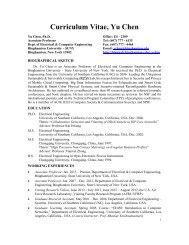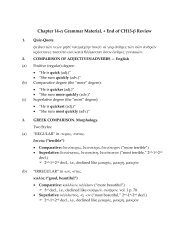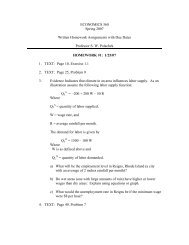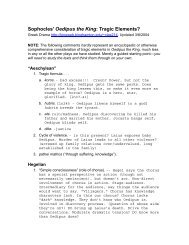Aristotle Poetics - Harvey.binghamton.edu
Aristotle Poetics - Harvey.binghamton.edu
Aristotle Poetics - Harvey.binghamton.edu
You also want an ePaper? Increase the reach of your titles
YUMPU automatically turns print PDFs into web optimized ePapers that Google loves.
<strong>Aristotle</strong> <strong>Poetics</strong> 20<br />
10<br />
ers to the goddess, she was made there the priestess of this rite. Long after that the<br />
brother of the priestess happened to come; the fact, however, of the oracle having for a<br />
certain reason bidden him go thither, and his object in going, are outside the Plot of the<br />
play. On his coming he was arrested, and about to be sacrificed, when he revealed who he<br />
was—either as Euripides puts it, or (as suggested by Polyidus) by the not improbable exclamation,<br />
“So I too am doomed to be sacrificed, as my sister was”; and the disclosure<br />
led to his salvation. This done, the next thing, after the proper names have been fixed as a<br />
basis for the story, is to work in episodes or accessory incidents. One must mind, however,<br />
that the episodes are appropriate, like the fit of madness in Orestes, which led to his<br />
arrest, and the purifying, which brought about his salvation. In plays, then, the episodes<br />
are short; in epic poetry they serve to lengthen out the poem. The argument of the Odyssey<br />
is not a long one.<br />
A certain man has been abroad many years; Poseidon is ever on the watch for him, and he<br />
is all alone. Matters at home too have come to this, that his substance is being wasted and<br />
his son’s death plotted by suitors to his wife. Then he arrives there himself after his<br />
grievous sufferings; reveals himself, and falls on his enemies; and the end is his salvation<br />
and their death. This being all that is proper to the Odyssey, everything else in it is episode.<br />
18<br />
20<br />
30<br />
40<br />
(4) There is a further point to be borne in mind. Every tragedy is in part complication<br />
(desis, “tying up”) and in part resolution (lusis, “untying”). The incidents before the<br />
opening scene, and often certain also of those within the play, form the complication, and<br />
the rest, the resolution. By complication I mean all from the beginning of the story to the<br />
point just before the change in the hero’s fortunes; by resolution, all from the beginning<br />
of the change to the end. In the Lynceus of Theodectes, for instance, the complication includes,<br />
together with the presupposed incidents, the seizure of the child and that in turn of<br />
the parents; and the resolution all from the indictment for the murder to the end. Now it is<br />
right, when one speaks of a tragedy as the same or not the same as another, to do so on<br />
the ground before all else of their plots, that is, as having the same or not the same complication<br />
and resolution. Yet there are many dramatists who, after a good complication,<br />
fail in the resolution. But it is necessary for both points of construction to be always duly<br />
mastered. (5) There are four distinct species of tragedy—that being the number of the<br />
constituents also that have been mentioned: first, the complex tragedy, which is all reversal<br />
and recognition; second, the tragedy of suffering (pathos), for instance the Ajaxes and<br />
Ixions; third, the tragedy of temperament (ethos), for instance the Phthiotides and Peleus.<br />
The fourth constituent is that of spectacle (opsis), exemplified in the Phorcides, in Prometheus,<br />
and in all plays with the scene laid in the underworld. The poet’s aim, then,<br />
should be to combine every element of interest, if possible, or else the more important<br />
and the major part of them. This is now especially necessary owing to the unfair criticism<br />
to which the poet is subjected these days. Just because there have been poets before him<br />
strong in the several types of tragedy, the critics now expect the one man to surpass that<br />
which was the strong point of each one of his predecessors.















